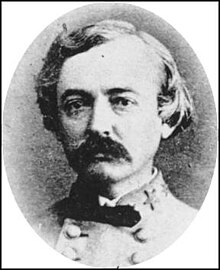 |
| General William H. C. Whiting |
HEADQUARTERS,
Wilmington, N. C., April 14, 1863.
Major General D. H. HILL,
Commanding near Washington, N. C.:
GENERAL: I have just received yours of the 12th,* inclosing a telegram* from Longstreet. I have received so many orders and counter-orders from so many different sources that really I am puzzled how to answer. The War Department has been directing me to re-enforce General Beauregard. The lieutenant-general commanding orders co-operation with you, while from his headquarters at Petersburg I get directions to aid Beauregard if the latter is urgent. Finally, General Beauregard suspends the movements of Evans' brigade. My position is then this: One regiment of Evans' brigade is in Charleston, having got off before the movement was stopped; the general himself is there; I have four here. I do not think the enemy have in the least given up their designs on Charleston. It is incredible that after such monstrous preparations they should give up-+ of that performance of the monitors. Nor am I apprehensive immediately of any demonstration on Wilmington, though such might be attempted. If, as you surmise, any feint should be made by land, your cavalry ought to let Ransom know the moment it is discovered, that he need not wait for me to call upon him. If your estimate of Foster's troops, viz, 8,000, is correct, and as Longstreet says he has received no more re-enforcements, he will neither dare to attack you nor to move on me. I know him too well. Still I must keep on the lookout. I only fear that my armament is not heavy enough to keep a monitor out. For one to get inside wold be a very serious embarrassment; but it will hardly be tried, I think, until the defenses of Charleston are more thoroughly tested; and surely unless they abandon their great expedition altogether before that first repulse they will not divert any portion of their land or naval forces for an attempt on a subordinate position. If I should hear that the fleet and transports had all passed the Charleston bar going northward I should think they were coming here and call for all the aid I could get. If they abandon their Charleston move Beauregard could aid me. In the mean time I do not like to think that your operations should be in any manner crippled to aid me unless at the last extremity. Your operations there are in fact my great security here, unless an additional expedition should be fitting out in the North of which we know nothing. I therefore hope you will be able to press Foster hard. He is not the man, nor Wessells either, to fight you and me both at once.
Very truly,
W. H. C. WHITING,
Brigadier-General.
*Not found.
+Illegible.
Official Records, Series I., Vol. 18, Part 1, Page 988.
Whiting has a pretty good grasp of the situation along the coasts, but is being pulled in different directions by Longstreet, Beauregard, and Richmond. He was in command at Wilmington, having arrived there after being detached by Lee after the Seven Days for less than exemplary performance.
No comments:
Post a Comment